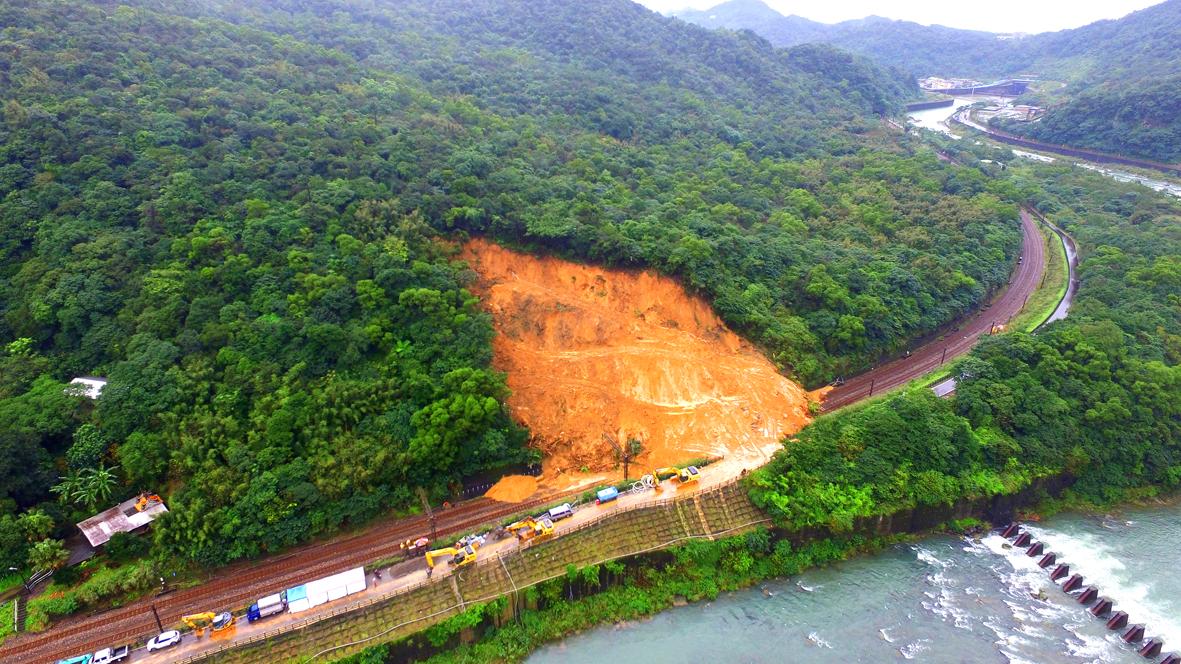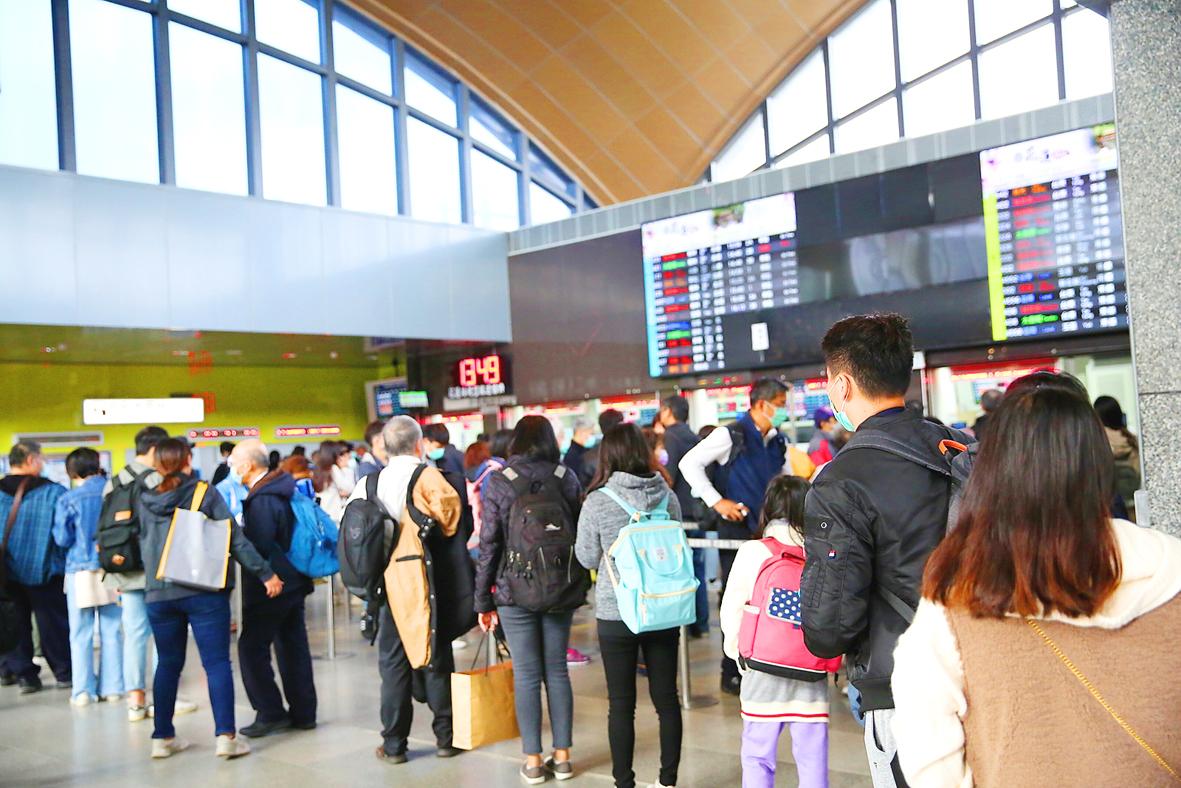About 30,000 people yesterday were diverted to intercity buses after a landslide in northeastern Taiwan the day before damaged a railway line and resulted in disruptions to services provided by the Taiwan Railways Administration (TRA).
The TRA said it is continuing to liaise with bus companies and hopes to increase the number of trips to expedite the transportation of passengers.
The landslide deposited 3,800m3 of rock, dirt and debris onto a section of tracks between Rueifang (瑞芳) and Houtong (猴硐) stations in New Taipei City at about 9am on Friday, disrupting transportation.

Photo courtesy of the Taiwan Railways Administration
One train traveling near the site barely avoided running into the towering mound of debris, stopping about 30m from where the side of a hill alongside the tracks had collapsed, after being alerted by TRA staff monitoring the area, the agency said.
TRA Division of Construction Affairs Deputy Director Chen Tsung-hung (陳宗宏) yesterday said that the TRA was working to remove the obstacles from the railway line, despite heavy rain.
Weather permitting and without further landslides, the TRA expects to resume one-way transportation through the affected area by Tuesday at the earliest, he added.

Photo: Wang Chin-yi, Taipei Times
People with tickets time-stamped from 8:30am on Friday for routes that would have taken them through the affected area would be eligible for a refund up until the day the obstacles have been removed, the TRA said.
People whose journeys have been delayed by the landslide by at least 45 minutes can visit any TRA station nationwide for a refund within a year, it added.
Those who had not reserved seats or did not experience such a delay can ride the same class of train once within one year, the TRA said.
People with electronic tickets can have their swipe-in information removed at an information office, while those with a season pass ticket would have their season pass extended by one day, it said.
The Directorate-General of Highways yesterday said it has asked major bus companies to divert buses from other routes to assist in transporting passengers to and from areas that are cut off by the landslide.
As of Friday, Metropolitan Transport Corp (大都會客運), running from New Taipei City’s Sindian District (新店) to Yilan County, had assisted with 128 trips and carried up to 1,701 passengers, while Kuokuang Bus (國光客運), running from the Yuanshan (圓山) area to Yilan County, had run 67 trips and carried up to 2,084 passengers, the highway authority said yesterday.
Kamalan Bus (葛瑪蘭客運) drove 537 trips and assisted with ferrying 15,464 passengers from New Taipei City’s Banciao District (板橋) to Yilan County, while Capital Bus (首都客運), running two routes — from the Taipei City Hall Bus Station to Yilan County and from Banciao to Hualien County — ferried 4,950 passengers in 165 trips, it said.
Taipei Bus (臺北客運), embarking from Taipei’s Nangang District (南港) to Hualien County, helped transport 213 passengers over four trips, while UBus (統聯客運), also on the same route, helped ferry 102 passengers over four trips, the directorate said.
The highway authority has also arranged for Keelung Bus Co (基隆汽車客運) to divert four buses to drive along the 808 bus’ original route, assisting with the transportation of 840 passengers, as of Friday.
Additional reporting by CNA

The Central Election Commission has amended election and recall regulations to require elected office candidates to provide proof that they have no Chinese citizenship, a Cabinet report said. The commission on Oct. 29 last year revised the Measures for the Permission of Family-based Residence, Long-term Residence and Settlement of People from the Mainland Area in the Taiwan Area (大陸地區人民在台灣地區依親居留長期居留或定居許可辦法), the Executive Yuan said in a report it submitted to the legislature for review. The revision requires Chinese citizens applying for permanent residency to submit notarial documents showing that they have lost their Chinese household record and have renounced — or have never

A magnitude 5.6 earthquake struck off the coast of Yilan County at 12:37pm today, with clear shaking felt across much of northern Taiwan. There were no immediate reports of damage. The epicenter of the quake was 16.9km east-southeast of Yilan County Hall offshore at a depth of 66.8km, Central Weather Administration (CWA) data showed. The maximum intensity registered at a 4 in Yilan County’s Nanao Township (南澳) on Taiwan’s seven-tier scale. Other parts of Yilan, as well as certain areas of Hualien County, Taipei, New Taipei City, Taoyuan, Hsinchu County, Taichung and Miaoli County, recorded intensities of 3. Residents of Yilan County and Taipei received

Taiwan has secured another breakthrough in fruit exports, with jujubes, dragon fruit and lychees approved for shipment to the EU, the Ministry of Agriculture said yesterday. The Animal and Plant Health Inspection Agency on Thursday received formal notification of the approval from the EU, the ministry said, adding that the decision was expected to expand Taiwanese fruit producers’ access to high-end European markets. Taiwan exported 126 tonnes of lychees last year, valued at US$1.48 million, with Japan accounting for 102 tonnes. Other export destinations included New Zealand, Hong Kong, the US and Australia, ministry data showed. Jujube exports totaled 103 tonnes, valued at

BIG SPENDERS: Foreign investors bought the most Taiwan equities since 2005, signaling confidence that an AI boom would continue to benefit chipmakers Taiwan Semiconductor Manufacturing Co’s (TSMC, 台積電) market capitalization swelled to US$2 trillion for the first time following a 4.25 percent rally in its American depositary receipts (ADR) overnight, putting the world’s biggest contract chipmaker sixth on the list of the world’s biggest companies by market capitalization, just behind Amazon.com Inc. The site CompaniesMarketcap.com ranked TSMC ahead of Saudi Aramco and Meta Platforms Inc. The Taiwanese company’s ADRs on Tuesday surged to US$385.75 on the New York Stock Exchange, as strong demand for artificial intelligence (AI) applications led to chip supply constraints and boost revenue growth to record-breaking levels. Each TSMC ADR represents